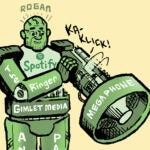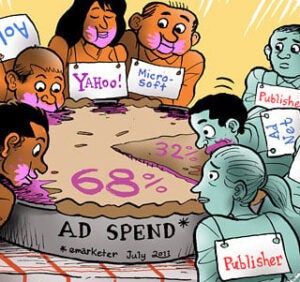After stagnant growth in 2017, holding companies are getting rid of assets that aren’t related to their core focus on digital transformation, programmatic, data and technology.
Omnicom, Publicis Groupe and WPP have significantly pruned their portfolios this quarter. IPG and Havas, on the other hand, have disposed of smaller and less strategic agencies in the US in the past which “were not growing as much as they could have and probably were a drag on margins, but not in a material way,” said Pivotal analyst Brian Wieser.
Here’s a look at what the three most aggressive pruners have done so far.
Omnicom
Omnicom sold 19 companies and reduced headcount by 7,000 in Q3 while consolidating real estate. Those actions helped boost quarterly net income by 13.5% and organic growth by 2.9%, the company said Tuesday on its earnings call.
Among Omnicom’s dispositions was Germany-based Sellbytel, a sales, support and human resources outsourcing company. Omnicom also sold off 18 other businesses in its CRM unit, which was down 4.4% in Q2. And in Q1, the group sold underperforming print media business Novus to drive better organic growth.
“These businesses were no longer aligned with our long-term strategy,” said Omnicom CEO John Wren during the company’s Q3 earnings call.
To modernize, Omnicom plans to reduce staff by over 1,400 people while replacing 50 positions to “refresh and upgrade our talent to meet our agency’s current needs,” Wren said. And Omnicom is not only saving on costs by consolidating real estate but creating “modern campus style hubs” that encourage “greater cross-agency collaboration,” he added.
In Q3, Omnicom acquired management and technology consulting firm Credera and performance marketing agency United Digital Group to “enhance our capabilities in digital transformation, data-driven solution and customer-centric services,” Wren said.
“We continue to focus on our agility and being able to offer our services to clients in a manner that is consistent with their go-to-market strategies,” he said. “This means having a flexible and nimble organization.”
But losing those tangential businesses doesn’t represent a huge strategic shift from Omnicom’s strategy of investing in strong agency brands like BBDO, DDB, TBWA and Omnicom Media Group, Wieser said.
“It’s more about financial optics than anything else,” he said. “When you look at what a client expects from a traditional advertising agency, those entities still exist and aren’t being pruned.”
AdExchanger Daily
Get our editors’ roundup delivered to your inbox every weekday.
Daily Roundup
Publicis
Publicis is disposing of health care business Publicis Health Services as part of its strategy to “dispose assets that are not core and not aligned with our strategies,” CEO Arthur Sadoun said on the company’s Q3 earnings call Thursday.
Publicis Health Services, which works with contract sales organizations, not only dragged down organic growth in the quarter but doesn’t fit into the holding company’s goal of delivering business transformation, dynamic creative and data to clients.
“If we want to bring marketing and business transformation, we have to focus only on that,” Sadoun said.
While Publicis, which Sadoun said is becoming a “platform,” didn’t reveal other divestments, it will continue to get rid of companies that aren’t central to its strategy. At the same time, it will acquire companies that help it scale its focus around business transformation, a discipline that grew 27% in the first half of the year.
“We’re actively looking for smaller operations that can bring either talent or expertise,” he said.
Publicis’ portfolio reduction could be part of a strategic shift toward integration, Wieser said.
“It’s a recreation of the old advertising agency, but with a business transformation practice as part of it,” he said. “The risk is, if you recombine and then try to bundle services, it could lead clients to think they can get discounts for taking multiple services.”
WPP
WPP has been exploring divestitures and consolidation since Mark Read took the reins from Martin Sorrell as CEO in April.
The holding company, which just posted its first quarter of growth in a year in July, has been widely criticized by clients and investors for being unwieldy and difficult to navigate. But since April, WPP has disposed of 15 non-core assets, including Globant and AppNexus, to generate $867 million in savings.
“They’re trying to prune back what was arguably too sprawling of a business that was hard for any one person to control,” Wieser said. “WPP has always been much more strategic in how it’s thought about M&A, so if a company doesn’t contribute to that strategy, get rid of it.”
While many speculated after Sorrell’s departure that the company would dispose of slow-growing research division Kantar, Read said he wants to “tidy up the portfolio around the edges” rather than let go of it.
“Some [divestitures] are relatively small, but disposing of them makes the group easier to manage,” he said on the Q2 earnings call.
Read will also simplify WPP through consolidation. In September, it merged creative agency Y&R with digital agency VML.
WPP has also made small, strategic acquisitions, including a 400-person ecommerce consultancy, Gorilla Group, which has strong Amazon expertise, and digital creative shop HZ.
















